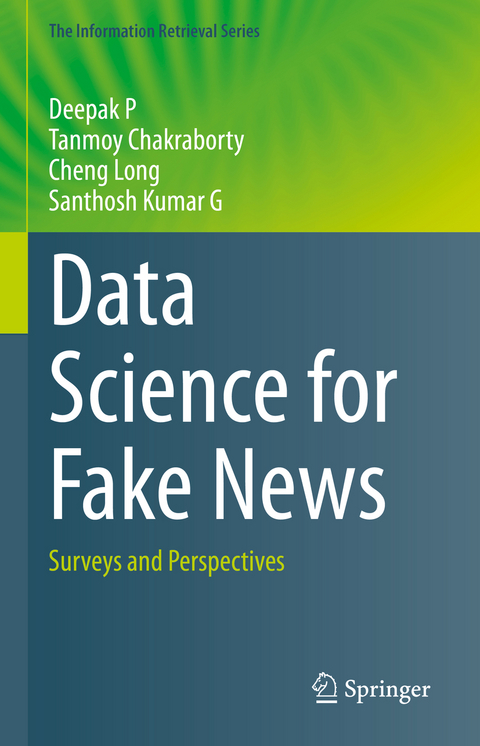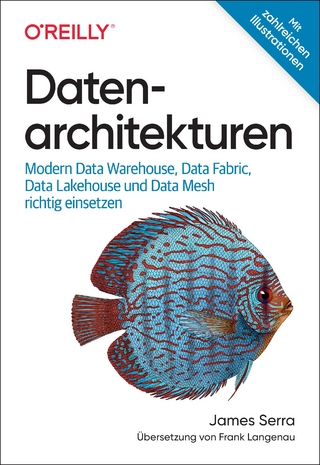
Data Science for Fake News
Springer International Publishing (Verlag)
978-3-030-62695-2 (ISBN)
The fake news challenge cuts across a number of data science subfields such as graph analytics, mining of spatio-temporal data, information retrieval, natural language processing, computer vision and image processing, to name a few. This book will present a number of tutorial-style surveys that summarize a range of recent work in the field. In a unique feature, this book includes perspective notes from experts in disciplines such as linguistics, anthropology, medicine and politics that will help to shape the next generation of data science research in fake news.
The main target groups of this book are academic and industrial researchers working in the area of data science, and with interests in devising and applying data science technologies for fake news detection. For young researchers such as PhD students, a review of data science work on fake news is provided, equipping them with enough know-how to start engaging in research within the area. For experienced researchers, the detailed descriptions of approaches will enable them to take seasoned choices in identifying promising directions for future research.
lt;b>Deepak P is an Assistant Professor of Computer Science at Queen's University Belfast, UK. Prior to this, he was a research scientist at IBM Research. His research interests include ethics for machine learning, natural language processing, and information retrieval. He is a senior member of the IEEE and the ACM, and has authored 90+ publications and is an inventor on 10+ patents.
Tanmoy Chakraborty is an Assistant Professor at the Department of Computer Science and Engineering, IIIT Delhi, India. Prior to this, he was a postdoctoral associate at University of Maryland, College Para, USA. His research interests include data mining, social media analysis and natural language processing.
Cheng Long is an Assistant Professor at the School of Computer Science and Engineering, Nanyang Technological University, Singapore. From 2016 to 2018, he worked as a lecturer at Queen's University Belfast, UK. His research interests are in data management, data mining and machine learning.
Santhosh Kumar G is a full Professor at the Department of Computer Science, Cochin University of Science and Technology, Kerala, India. His research interests include cyber physical systems, machine learning and natural language processing.
A Multifaceted Approach to Fake News.- Part I: Survey.- On Unsupervised Methods for Fake News Detection.- Multi-modal Fake News Detection.- Deep Learning for Fake News Detection.- Dynamics of Fake News Diffusion.- Neural Language Models for (Fake?) News Generation.- Fact Checking on Knowledge Graphs.- Graph Mining Meets Fake News Detection.- Part II: Perspectives.- Fake News in Health and Medicine.- Ethical Considerations in Data-Driven Fake News Detection.- A Political Science Perspective on Fake News.- A Political Science Perspective on Fake News.- Fake News and Social Processes: A Short Review.- Misinformation and the Indian Election: Case Study.- STS, Data Science, and Fake News: Questions and Challenges.- Linguistic Approaches to Fake News Detection.
| Erscheinungsdatum | 01.05.2021 |
|---|---|
| Reihe/Serie | The Information Retrieval Series |
| Zusatzinfo | XIV, 302 p. 70 illus., 17 illus. in color. |
| Verlagsort | Cham |
| Sprache | englisch |
| Maße | 155 x 235 mm |
| Gewicht | 631 g |
| Themenwelt | Mathematik / Informatik ► Informatik ► Datenbanken |
| Schlagworte | data analytics • Fake News • Information Retrieval • Media Analytics • media security • Web Search |
| ISBN-10 | 3-030-62695-4 / 3030626954 |
| ISBN-13 | 978-3-030-62695-2 / 9783030626952 |
| Zustand | Neuware |
| Informationen gemäß Produktsicherheitsverordnung (GPSR) | |
| Haben Sie eine Frage zum Produkt? |
aus dem Bereich


